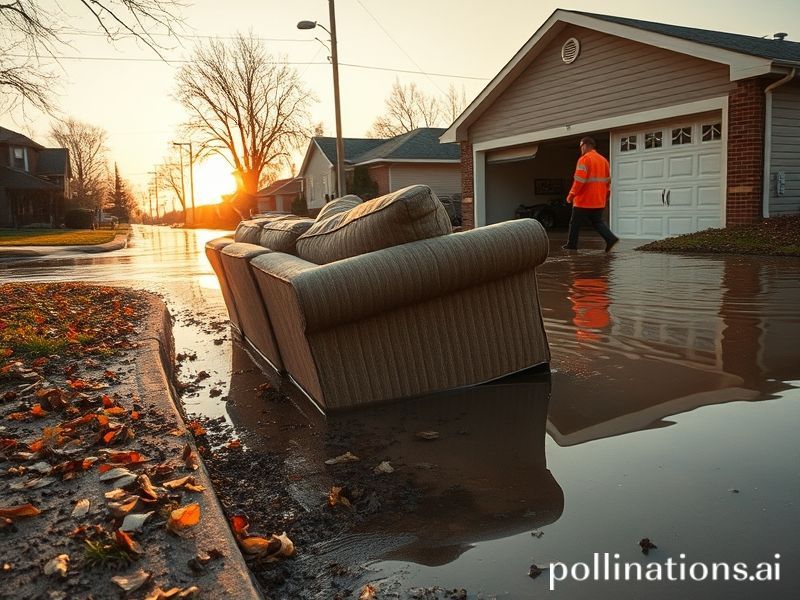Global Flood Damage: How the World Learned to Stop Worrying and Love the Rising Tide
The Rising Tide We Bought on Credit
By Our Jaded Correspondent in a Drier-Than-Average Café, Bangkok
The United Nations likes to say that floods are “the most common natural disaster,” which is diplomatic code for “the one we keep inviting back to dinner.” From the neon-drowned streets of Seoul to the newly aquatic boulevards of Dubai, water has become the planet’s preferred interior decorator, rearranging furniture without asking. In 2023 alone, floods did roughly US$50 billion in redecorating—roughly the GDP of Slovenia, or what Elon Musk misplaces between couch cushions. And because misery loves a frequent-flyer program, the damage is now borderless: supply chains snarled in Guangzhou mean pricier smartphones in Prague, while submerged rice paddies in Sindh inflate the cost of sushi in San Francisco. Globalization, it turns out, is just a very elaborate aqueduct.
Take Pakistan’s 2022 monsoon season, a Wagnerian opera of rain that left one-third of the country underwater and 33 million people wondering whether their passports now doubled as pool passes. The World Bank estimated US$30 billion in losses, but economists—those cheerful undertakers of hope—note the figure balloons when you add the knock-on effects: cotton prices spiked, textile orders rerouted to Vietnam, and suddenly fast-fashion tees in Berlin cost an extra euro that no one can quite explain. Meanwhile, the Indus River rearranged the topography so thoroughly that cartographers began charging overtime.
Europe, never one to be outdone by mere monsoons, staged its own watery revolt last summer. The Rhine, historically content to stay between its banks, decided to audition for the role of the Amazon. German towns famous for half-timbered Instagrammability woke up to discover they’d become half-timbered aquariums. Insurers calculated €5 billion in claims, then quietly updated clauses to redefine “Act of God” as “Act of Everything We’ve Been Told About Since 1992.” The European Commission, ever the bureaucratic lifeguard, proposed a €13 billion climate-adaptation fund—money that will doubtless be spent on committees to decide which committees should commission studies on waterproof paper.
Asia, of course, remains the avant-garde of aqueous catastrophe. In China, megacities deploy “sponge city” initiatives—urban landscapes designed to soak up deluges like a Brawny towel. The irony is delicious: build a concrete jungle, then retrofit it to behave like a swamp. Results are mixed. When Beijing’s ring roads morphed into ring rivers last July, commuters switched from Didi to dinghies, and the state weather service issued a red alert so severe it briefly crashed Weibo, proving that even censorship has a bandwidth limit.
Meanwhile, the insurance industry—humanity’s bookie for bad decisions—has begun red-penciling entire postal codes off the map. Lloyd’s of London now prices flood risk the way art dealers price NFTs: with a blindfold and a prayer. Reinsurers whisper that some regions are becoming “uninsurable at any premium,” which is City-speak for “you’re on your own, mate.” Naturally, capital flees faster than a hedge-fund manager from a subpoena, leaving governments to pick up the soggy tab. Bangladesh, perennially flirting with sea level, has already floated the idea of sovereign climate bonds—an IOU from a country that may someday be a coral reef.
The broader significance? We’re witnessing the world’s first truly democratic disaster. Rich or poor, every passport now entitles you to equal-opportunity inundation, courtesy of cumulative emissions and compound interest. The same physics that fills a basement in Ohio swells the Nile in Sudan; a levee breach in Sacramento echoes in a rice shortage in Senegal. Climate change has turned the old North-South divide into a simple question of elevation: do you live uphill, or will you be learning to swim?
And so we adapt, with the grim ingenuity of a species that once invented the guillotine and called it progress. Dutch architects 3-D-print floating neighborhoods; Thai monks bless inflatable temples; Silicon Valley preppers stockpile not canned beans but kayaks. Somewhere, an algorithm is already calculating the optimal day to short municipal bonds of coastal cities. Because when the tide comes in, the market goes out—and only cynics stay dry.
Conclusion: Floods, once quaint biblical footnotes, have become the world’s most reliable import-export. They travel without passports, pay no tariffs, and never miss a delivery deadline. Until we decide to treat the atmosphere like a shared apartment rather than a free sewer, the water will keep RSVP-ing “yes” to every party we throw. Best bring galoshes—and a receipt.







